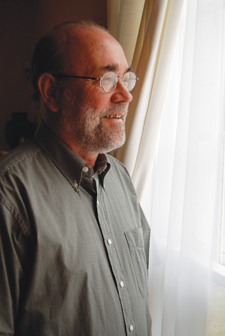Conversation with … Howard Stone, PhD
Brite Divinity School professor shines a light on depression in Defeating Depression: Real Help for You and Those Who You Love.
Conversation with … Howard Stone, PhD
Brite Divinity School professor shines a light on depression in Defeating Depression: Real Help for You and Those Who You Love.
As an expert on depression, Brite Divinity School faculty member Howard Stone is surprisingly popular at parties. “When people find out I study depression, they start telling me what medication they’re on,” said Stone, a psychologist, marriage and family therapist and professor emeritus at Brite. It’s a big change from when he entered the field almost four decades ago when depression was still largely lived in the shadows. Stone, who has battled depression himself, recently published the book Defeating Depression: Real Help for You and Those Who You Love You to explain the condition and offer specific ways to deal with it.
 Why did you decide to write this book?
Why did you decide to write this book?
I’d written books specifically for helpers and theologians and edited others for professionals. I wanted to write one that went directly to the person. It took me about two and half times longer to write to a more general audience. You have to work even harder at phrasing so it is clearer. I tried to write it so people with a 10th-grade education would be able to understand it, but I also wanted to write it in a way so I wouldn’t dumb it down for readers with master’s degrees and PhDs. I wanted a self-help book for people who were fairly smart – one that wouldn’t promise things that can’t be delivered but sell books.
What should be the first step for people who might be suffering from depression?
First, take the quiz in the book. You may just be dealing with something like stresses at work. Find out if it is depression. The second step would be to see your family physician. There are side effects to certain medications that can act like depression. There can also be physiological causes of depression. In my practice as a counselor, I can think of one case when a person had cancer and they were coming to me for depression. In another case, someone had a brain tumor. They were acting depressed, but there was a physiological cause.
What is the most important thing you’ve learned through your own battle with depression and in your research?
The big change for me occurred for me when I was able to see depression from both sides – both as a clinician and also as someone who was depressed. You don’t need to have experienced depression to be a good therapist or to be a good friend, but you certainly do gain some insight from sitting in the other chair. That compelled me to do a lot more research on melancholy and is why I’ve spent the last 30 to 40 years studying the topic.

Your comments are welcome
Comments
Related Reading:
Campus News: Alma Matters
From Application to Admission
Amid an increasingly selective admission process, Heath Einstein leads the team that builds the TCU community of the future.
Campus News: Alma Matters
From the Chancellor
Chancellor Victor J. Boschini, Jr., identifies what made TCU and its sesquicentennial so memorable.